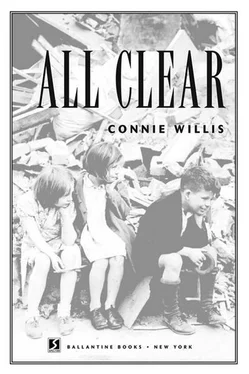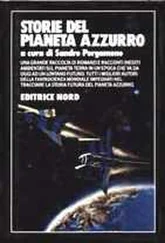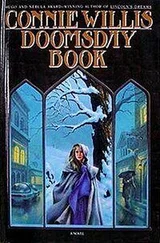Connie Willis - All Clear
Здесь есть возможность читать онлайн «Connie Willis - All Clear» весь текст электронной книги совершенно бесплатно (целиком полную версию без сокращений). В некоторых случаях можно слушать аудио, скачать через торрент в формате fb2 и присутствует краткое содержание. Жанр: Старинная литература, на английском языке. Описание произведения, (предисловие) а так же отзывы посетителей доступны на портале библиотеки ЛибКат.
- Название:All Clear
- Автор:
- Жанр:
- Год:неизвестен
- ISBN:нет данных
- Рейтинг книги:5 / 5. Голосов: 1
-
Избранное:Добавить в избранное
- Отзывы:
-
Ваша оценка:
- 100
- 1
- 2
- 3
- 4
- 5
All Clear: краткое содержание, описание и аннотация
Предлагаем к чтению аннотацию, описание, краткое содержание или предисловие (зависит от того, что написал сам автор книги «All Clear»). Если вы не нашли необходимую информацию о книге — напишите в комментариях, мы постараемся отыскать её.
All Clear — читать онлайн бесплатно полную книгу (весь текст) целиком
Ниже представлен текст книги, разбитый по страницам. Система сохранения места последней прочитанной страницы, позволяет с удобством читать онлайн бесплатно книгу «All Clear», без необходимости каждый раз заново искать на чём Вы остановились. Поставьте закладку, и сможете в любой момент перейти на страницу, на которой закончили чтение.
Интервал:
Закладка:
Directly inside the door was a bright red signpost with arrows pointing to various exhibits: “The Battle of the North Atlantic,” “The Holocaust,” “Living Through the Blitz.” He followed the last arrow down a corridor to a doorway piled high with sandbags. A bucket of water stood in front of the sandbags with a stirrup pump in it. Above the door was written, “ ‘This was their finest hour.’ Winston Churchill,” and, as he passed through the doorway, an air-raid siren began to warble.
He was in a short corridor lined with framed black-and-white photographs: a burnt-out church, rows and rows of barrage balloons over London, a street of bombed houses, the dome of St. Paul’s floating above a sea of smoke and flames. At the end of the corridor was another doorway, across which hung a heavy black curtain.
From somewhere beyond it, he could hear a drone of planes and the crump of bombs. He went through the curtain.
Into total blackness. “Look out in the blackout,” a recorded voice said. He peered into the darkness, searching for Camberley. He couldn’t see her, but as his eyes adjusted, he could make out two round white lights with black bars across them which must be an automobile’s headlamps, and on the floor, a white-lined pathway leading to another curtained door, dimly illuminated by the headlamps. And just going through it, Camberley. He started toward her.
“Connor?” a woman’s voice called from behind him. He turned around and then remembered his name wasn’t Connor here and stopped, hoping the darkness had hidden his involuntary reaction. That was how the Nazis caught British spies, he thought, by suddenly calling them by their real name.
He continued following Camberley.
“Connor?” the woman’s voice said again, and he felt a hand on his arm. “I thought that was you. What a lucky coincidence! What are you doing here?”
Nothing could be seen but the tops of the towers of the palace, and even those only from a good way off.
—SLEEPING BEAUTY
Wales—May 1944
THE PRISON CAMP WASN’T NEAR PORTSMOUTH. IT WAS IN Gloucestershire, and Ernest and Cess ended up driving all night to get there. They got lost twice, once because of their inability to see anything in the blackout and the second time because of the lack of signposts. “Which is a good thing, really,” Cess said, struggling with the map. “If there were signposts, we wouldn’t be able to pull this off.”
If we can’t find the colonel, we won’t be able to pull it off either, Ernest thought irritably. He hadn’t felt this tired since that endless day in Saltram-on-Sea. If the Lady Jane were available, he’d gladly curl up in her hold, but they were nowhere near water. Or anything else. “Have you any idea at all where we are?” he asked Cess.
“No. I can’t find—oh, bloody hell, I’ve got the wrong map.” Cess unfolded the other one, peered at it, and then looked out at the road. “Go back to that last crossroads,” he said, and as Ernest backed the car around, he added, “I’ve just had an idea. I think we should get lost.”
“We are lost.”
“No, I mean after we pick up Colonel von Sprecht. We should pretend we don’t know where we are.”
“We may not have to pretend,” Ernest said as they reached the crossroads. “Which of these roads do I take?”
Cess ignored him. “You could say, ‘Where are we?’ and I could say, ‘Here, at Canterbury,’ and you could say, ‘Give me the map,’ and we could hold the map so he can see it and then argue over where we are. People always say things they shouldn’t when they’re arguing, and it would be far more believable than my saying,
‘Here we are at Canterbury,’ for no reason. What do you think?”
“I think you need to tell me which road to take.”
“Bear left. Oh, and we’re going to need a code in case I need to tell you something we don’t want him to hear. Suppose I say, ‘I believe we have a puncture?’ Then you’ll know to stop the car, and we can get out and talk.”
“No, a puncture’s something he’d be able to feel. How about, ‘I hear a knock in the engine’?”
“Yes, that’s good. It will mean putting the bonnet up, which will keep him from reading our lips. If I tell you I hear a knock, you pull over—No, I don’t mean now.
Why are you stopping?”
“Because left was obviously the wrong way to turn,” Ernest said, indicating the lane, which had ended in the middle of a sheep-filled meadow.
“Oh. Sorry,” Cess said, consulting the map again. “Go back to the crossroads again and bear right.”
“You have no idea where we are, do you?” Ernest asked, backing.
“No,” Cess admitted cheerfully, “but it’s growing light. That should make it easier to find our way.”
If he’d known they were going to spend hours and hours wandering around Wales like this, he’d have insisted on delivering his articles to the Call on the way. It would only have meant a half hour’s detour, and he’d at least have something to show for this damned trip. He obviously wasn’t going to have any chance to ask where Denys Atherton was. There wasn’t even anyone they could ask where the camp was.
“Now which way do I turn?” he asked.
“Left … no, right…,” Cess said doubtfully. “No, go straight ahead.” He pointed. “There’s the camp.”
Ernest drove up to the gate. “Who are we again?”
Cess checked their papers. “I’m Lieutenant Wilkerson and you’re Lieutenant Abbott.”
“Lieutenants Abbott and Wilkerson here to pick up Colonel von Sprecht,” Ernest told the guard. The guard glanced at their papers, handed them back, and waved them toward the camp commander’s office.
“I’ll inform the commander you’re here,” the sergeant there said. “Please wait here.” He disappeared into the commander’s office.
An hour later they were still waiting. “What’s taking so long?” Cess asked anxiously. He stood up and went over to the window to look out. “What if the weather clears?”
“The forecast said it would be cloudy all day, with rain after noon,” Ernest said, looking at the route they were going to be taking. It led straight through the center of the invasion buildup. And Denys Atherton was there somewhere, if he could just find him.
“What if the forecast’s wrong? The one for the dedication of that dummy oil depot in Dover was wrong. It said the weather would be fair that day, and we nearly drowned. If it’s fair today, the colonel will be able to tell by the sun what direction we’re going, and it won’t matter what we tell him.”
“It won’t turn off fair. Stop worrying,” Ernest said, still thinking about Atherton. How was he supposed to look for him with a German prisoner in the car? Even if he could think of a reason for asking which would satisfy Cess, anyone he asked might mention their real location, and he couldn’t risk jeopardizing the mission they were on.
He wished for the thousandth time he knew whether historians could affect events. And which of Fortitude South’s deceptions had worked. Had the Germans believed what von Sprecht told them? Had they even questioned him? And had they believed the faked photo ops and the carefully planted articles in the Call and the Shopper and the Banner? Which ones? The ones he was supposed to have turned in to the Call yesterday?
“It’s definitely clearing off,” Cess said. “I’m certain I saw a patch of blue. What if he tries to escape?”
“Who?”
“The prisoner. What if he tries to run off? Or to kill us? He might be dangerous—”
“He’s ill,” Ernest said, frowning at the map. “That’s why they’re repatriating him, and if he was dangerous, they’d scarcely have sent us.”
“A lot you know. Remember that farmer’s bull?”
Читать дальшеИнтервал:
Закладка:
Похожие книги на «All Clear»
Представляем Вашему вниманию похожие книги на «All Clear» списком для выбора. Мы отобрали схожую по названию и смыслу литературу в надежде предоставить читателям больше вариантов отыскать новые, интересные, ещё непрочитанные произведения.
Обсуждение, отзывы о книге «All Clear» и просто собственные мнения читателей. Оставьте ваши комментарии, напишите, что Вы думаете о произведении, его смысле или главных героях. Укажите что конкретно понравилось, а что нет, и почему Вы так считаете.












